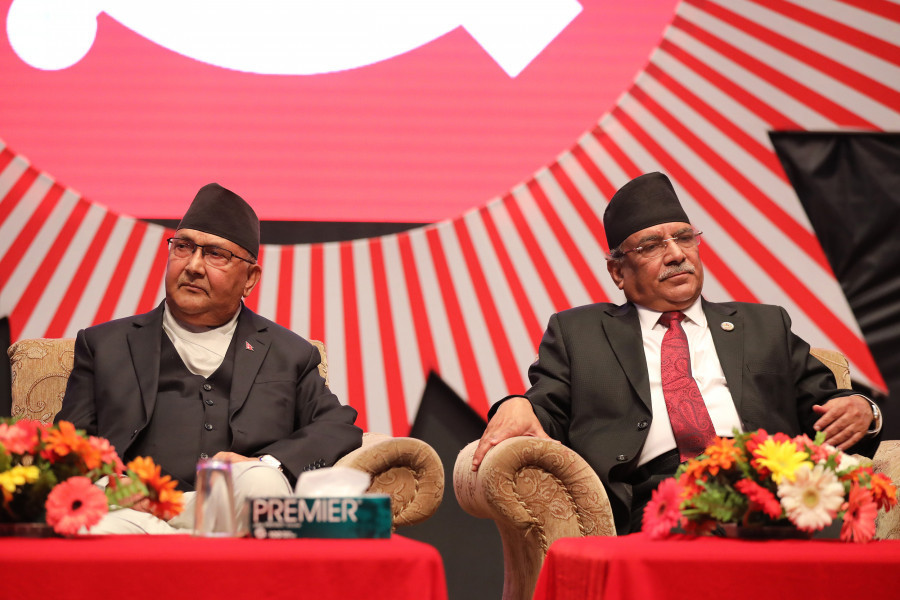Politics
Could Nepal’s communists reunite to fend off emerging political forces?
Prime Minister Dahal says they are working to re-establish a unified communist party.
Tika R Pradhan
Prime Minister Pushpa Kamal Dahal, who held over an hour-long meeting with CPN-UML chair KP Sharma Oli at Singha Durbar on Friday, said efforts were on to revive the Nepal Communist Party.
Dahal, who was one of the two chairs of the Nepal Communist Party (NCP) which was dissolved by a March 2021 Supreme Court decision, said although the NCP was “caught in an accident due to the obsession of a few leaders”, he wants to revive the unity.
“A socialist front will be formed in a few days and that front will ask everyone to return to the Nepal Communist Party,” Dahal said on Sunday while addressing a function organised by the CPN (Unified Socialist) to mark the establishment day of the Nepal Communist Party.
Prime Minister Dahal, who patched up with the Congress chief Sher Bahadur Deuba-led alliance almost two months after he became prime minister with the UML’s backing, now says efforts are going on to revive a unified force like the NCP by learning from past mistakes. “We are still in favour of unity,” Dahal said. “We should revive the Nepal Communist Party.”
He said leadership is considered to be key in the communist party set up as a wrong decision of the leadership can lead to disaster. “It happens in the international arena and we have also experienced it here,” Dahal said.
Some senior leaders of the CPN (Maoist Centre) and the Janata Samajbadi Party said they were preparing to announce a socialist front involving three parties—the Maoist Centre, the Janata Samajbadi Party and the CPN (Unified Socialist).
“We are preparing to announce a socialist front after the results of the by-polls are out,” said Rajendra Shrestha, a senior leader of the Janata Samajbadi Party (JSP).
JSP chair Upendra Yadav is a candidate from Bara-2 House seat on behalf of the ruling coalition.
Chairman of CPN (Unified Socialist) Madhav Kumar Nepal said a socialist front would be formed soon among like-minded communist forces.
“If we remain scattered as small groups, rightist forces will take advantage. But if we unite, we can lead the country’s politics and the campaign to bring about change,” said Nepal while addressing an interaction organised by his party.
He also said the parties sharing similar ideologies, principles, political agenda, and organisational thoughts and working approaches would come together.
But some leaders in these three parties are unhappy with ongoing developments, saying the unity or the formation of an alliance must be based on more than elevating some leaders to positions of power.
A senior leader of CPN (Unified Socialist) Jhala Nath Khanal questioned the purpose of forming the socialist front.
“Why do we need a socialist front now? What are the objectives or reasons to set up such a front?” Khanal told the Post.
The former prime minister said the NCP could not sustain as the party’s only objective was to make KP Oli and Dahal prime ministers.
Even those in the ruling coalition see the fault in the functioning of their top leaders.
“Without any regard for principles or ethics, Dahal abruptly quit the coalition to clinch power, and then abruptly returned without any hesitation,” said a senior leader of the Janata Samajbadi Party asking not to be named. “So did our chairman, who forged an electoral alliance with the UML in the previous polls, but elected the country’s Vice President through another alliance, and now he is cursing the UML. Isn’t this opportunistic politics?”
The senior leader also claimed that this sort of behaviour of the leaders of established parties was responsible for the growing public frustration, thus giving rise to new political parties.
Asked about the intent behind the front’s creation, the leader said all top leaders were self-centred and did everything to serve their personal interests.
Some political analysts are also of the view that the statement made by Dahal on Sunday regarding reviving the NCP was nothing but his realisation of the new threat for established parties.
“Be it during the local polls or national polls to the by-election held today [Sunday], the leaders have increasingly internalised the threat from new parties,” said Jhalak Subedi, an observer of Nepal’s leftist politics. “Whatever leaders say—be it regarding a socialist front or the NCP’s revival, it’s nothing more than the realisation of the threat to their own selves.”




 20.9°C Kathmandu
20.9°C Kathmandu















